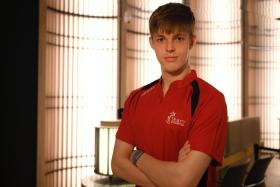Jing Wen to study and train in the US after SEA Games
For decades, many Singapore swimmers have relocated to the United States to train and study, to varying degrees of success in the pool.
Veteran swim coach David Lim believes that national swimmer Quah Jing Wen has what it takes to succeed on both fronts.
The 16-year-old will be joining the Texas A&M University in the US after this month's SEA Games in Kuala Lumpur.
Ting Wen, her elder sister, graduated from the University of California, Los Angeles, while her elder brother Zheng Wen moved to train and study at UC Berkeley in January this year.
Jing Wen was not available for comment yesterday.
"The Quah siblings are self-disciplined, they get things done and they know what it takes to succeed," said Lim, who is the founder of the Swimfast Aquatic Club that the Quah siblings all represent in club meets locally.
"With Ting Wen and Zheng Wen before her, Jing Wen will know and understand the dangers and pitfalls of such moves, and avoid them."
The move comes just as Jing Wen is blossoming as a high-performance swimmer.
She beat Ting Wen, an established swimmer herself, in the women's 100m and 200m freestyle at the Singapore National Swimming Championships in June, and won the 200m fly in the same meet.
Jing Wen also won five golds and a silver at the recent Commonwealth Youth Games in the Bahamas, the most among her teammates in that meet.
The teenager clinched the women's 400m individual medley bronze at the 2015 SEA Games, and is pencilled in for five individual events in KL this month.
Texas A&M is coached by two-time US Olympic team coach Steve Bultman, and competes in Division 1 of the National Collegiate Athletic Association Swimming and Diving Championships.
Her future teammates include Bethany Galat and Sydney Pickrem, who clinched the 200m breaststroke silver and the 400m IM bronze at the recently concluded Fina World Championships in Budapest.
While Lim is confident that Jing Wen will succeed on both the academic and athletic fronts, he warned that the bedding-in period would be the most crucial.
The former national swimmer said: "The first three months would be the most important. That's where she will be on her own for everything, from getting used to the food, to the environment and culture."
Get The New Paper on your phone with the free TNP app. Download from the Apple App Store or Google Play Store now



